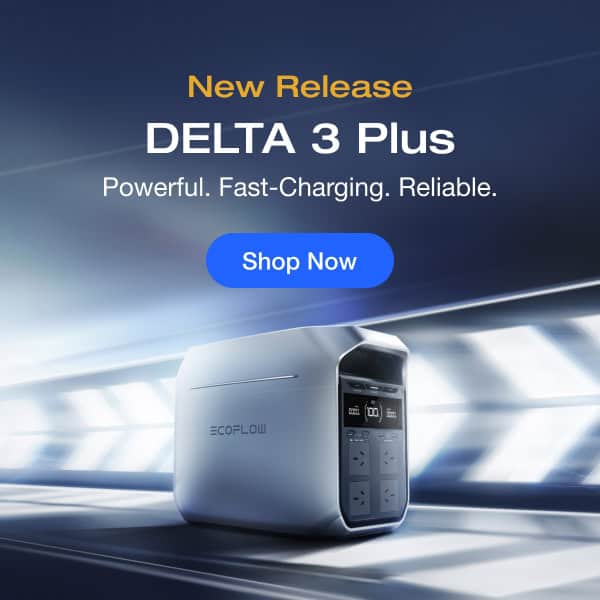Solar generators harness the sun’s energy and provide a renewable (and reliable) off-grid or backup power solution. EcoFlow’s Solar Generators can fully charge in under an hour, depending on what power input you use and several other factors.
The good news is you have the option to recharge your EcoFlow Solar Generator in various ways. If you’re in a hurry and collecting solar energy isn’t possible, alternative charging options can be a game changer.
Read on to learn how long a solar generator takes to charge using solar panels, alternative charging options, and what impacts the charge rate so that you always have power available when you need it most.
How Long Does It Take to Charge a Solar Generator?
Solar generators can take between 1.5 and 48 hours to charge, depending upon various factors.
How long a solar generator takes to charge depends on the size (also known as the capacity) of the solar battery or Portable Power Station. Another crucial factor is the energy source — solar panels, wall outlets, or a car battery.
When you generate and store energy using solar panels and a solar battery, there are a few things to keep in mind:
- The input capacity and number of solar panels
- Amount of available sunlight to convert into solar power (time of day and weather are crucial factors)
- Positioning of the solar panels
Here are some EcoFlow Solar Generator examples to give you a frame of reference
EcoFlow River 2 + 110W Solar Panel

- Capacity: 256Wh
- Wall Outlet AC: 1 hour
- Car Adaptor 12V: 3 hours
- Solar Panels: 3 hours with 110W panels
- Recharge from 0%: 0-100% in 60 minutes
EcoFlow DELTA + 160W Solar Panel

- Capacity: 1260Wh
- Wall Outlet AC: 1.6 hours
- Car Adaptor: 13.5 hours
- Solar Panels: 4-8 hours w/3 x 160W panels
- Recharge from 0%: 0-80% in 60 minutes
EcoFlow DELTA Max + 160W Solar Panel

- Capacity: 2016Wh
- Wall Outlet AC: 1.8 hours
- Car Adaptor: 21 hours
- Solar Panels: 3.2-6.3 hours w/400W x 2 panels
- Recharge from 0%: 0-80% in 65 minutes
Factors That Affect How Long Solar Charging Takes
Several factors affect the charge time if you generate power using solar panels.
Solar Panels
The amount of power solar panels can capture depends mainly on surface area and energy efficiency. The more watts a solar panel can produce, the faster it can charge a solar generator or battery.
One component of solar panels that directly impacts power output is the type of photovoltaic cells (PV) used. The higher the quality of the PV cells, the more efficiently the solar panels can collect and store energy.
EcoFlow Solar Panels use highly efficient monocrystalline silicon cells. Monocrystalline solar panels offer greater efficiency and require less space than polycrystalline solar panels.
The Weather
The weather is a variable that is likely to change. You’ll need to place your panels in a location that optimises sun coverage to charge quickly.
The sun is something no one can control, and this will ultimately determine the speed of charge. Cloud cover impacts the energy that the panels can harvest.
One way to combat low sunlight conditions is to add more PV panels or purchase ones with higher capacity.
The Angle of the Solar Panels
Solar panels should be positioned perpendicular to the sun to capture the most UV during the day. Think about the solar panels on household roofs – these are usually tilted or angled.
It is also better to rotate portable solar panels as the sun moves for maximum light exposure.
Efficiency Rating
The efficiency rating refers to how much sunlight the panels can convert. The standard in the industry is 15-18 per cent, but EcoFlow panels boast a 21-22% efficiency rating, thanks to the EcoFlow battery management system.
Battery Capacity
The battery capacity is the total electricity generated and stored. The bigger the battery, the more energy it can store, but also the longer it takes to charge.
Smaller power stations recharge more quickly but run down faster when the generator is heavily used.
Having additional battery storage available is a smart move as you can harvest more energy when the conditions are most favourable. You can buy extra battery packs to add to your portable power station and get ahead when the sun’s out.
How Do You Charge a Solar Generator?
You can maximise your solar generator use by keeping it charged. As governments encourage every household to transition to a carbon-free electric grid, you can be part of the change.
Solar generators help in these endeavours by freeing people from reliance on the grid. There are many different options for charging them.


